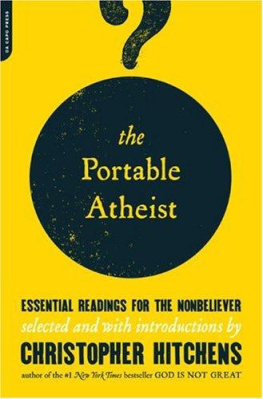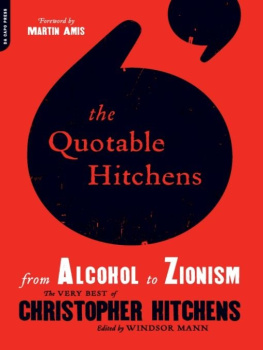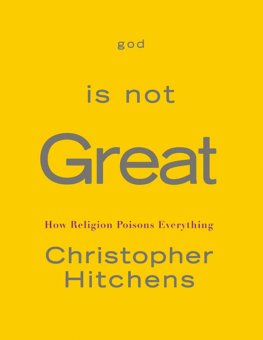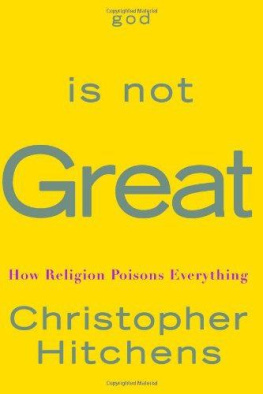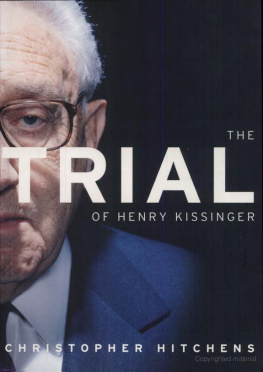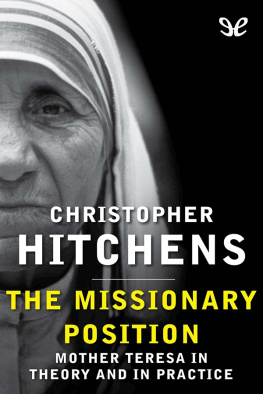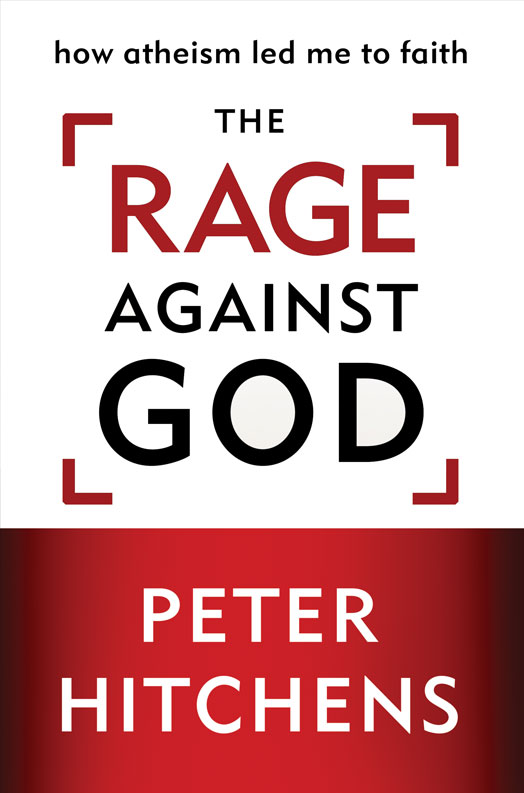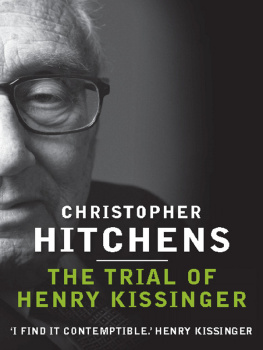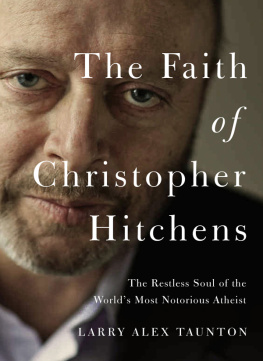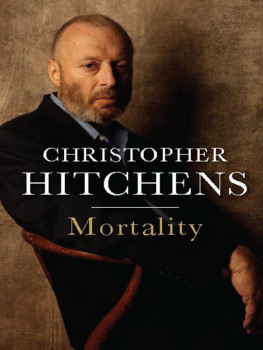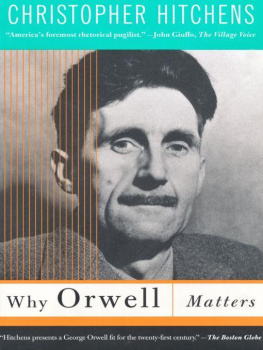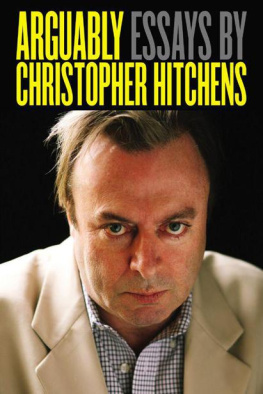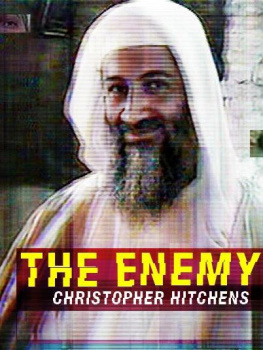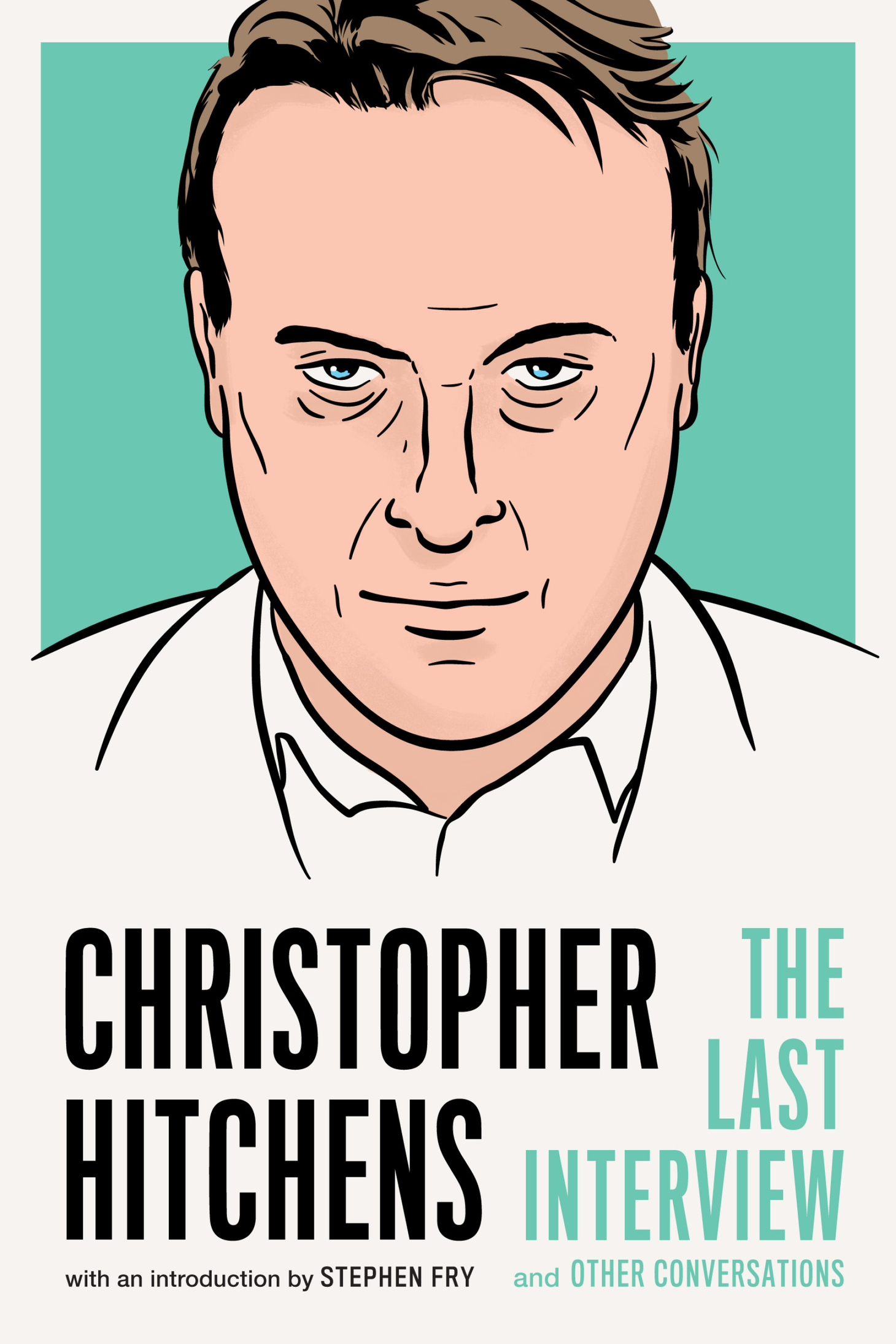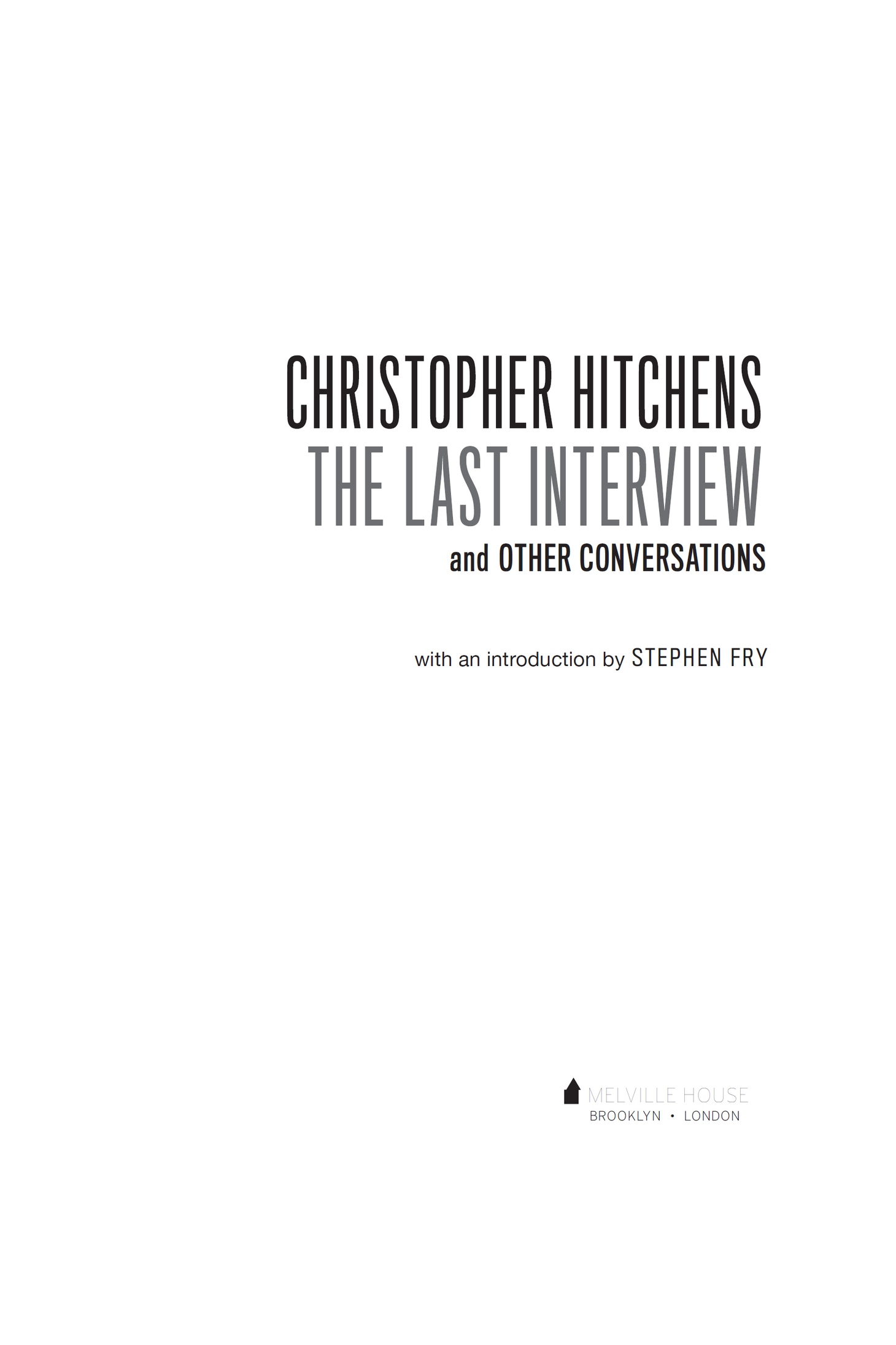Contents
CHRISTOPHER HITCHENS: THE LAST INTERVIEW AND OTHER CONVERSATIONS
Copyright 2017 by Melville House Publishing
Introduction Stephen Fry 2017.
Hitchens on the Media 1987 by the National Cable Satellite Corporation. Transcript made by Melville House Publishing from C-Span television program, originally aired February 10, 1987.
An Interview with Christopher Hitchens on Mother Teresa 1996 by the Council for Secular Humanism. This article originally appeared in the Fall 1996 issue of Free Inquiry.
Christopher Hitchens First published in the February 1997 issue of The Progressive.
Hitchens on Literature is reproduced with the permission of James Hughes. First published in Stop Smiling, Issue 20: Boxing, April 2005.
Comedy Centrals The Daily Show used with permission by Comedy Central. 2017 by Viacom Media Networks. All Rights Reserved. Comedy Central, all related titles, characters, and logos are trademarks owned by Viacom Media Networks, a division of Viacom International Inc. Transcript made by Melville House Publishing from The Daily Show television program, originally aired August 25, 2005.
Questions of Faith is reproduced with the permission of Zach Dundas. First published in Portland Monthly, January 2010.
Christopher Hitchens: You have to choose your future regrets. First published in The Guardian on November 13, 2010.
Never be afraid of stridency: Richard Dawkins interview with Christopher Hitchens. First published in New Statesman, December 2010.
First Melville House printing: December 2017
Melville House Publishing
46 John Street
Brooklyn, NY 11201
and
8 Blackstock Mews
Islington
London N4 2BT
Ebook ISBN9781612196732
A catalog record for this book is available from the Library of Congress.
v5.1
a
CONTENTS
HITCHENS ON THE MEDIA
INTERVIEW BY CARL RUTAN
C-SPAN
FEBRUARY 10, 1987
HITCHENS ON MOTHER TERESA
INTERVIEW BY MATT CHERRY
FREE INQUIRY
FALL 1996
CHRISTOPHER HITCHENS
INTERVIEW WITH SASHA ABRAMSKY
THE PROGRESSIVE
FEBRUARY 1997
HITCHENS ON LITERATURE
INTERVIEW BY J. C. GABEL AND JAMES HUGHES
STOP SMILING, ISSUE 20: BOXING
APRIL 2005
HITCHENS ON THE WARS IN IRAQ AND AFGHANISTAN
INTERVIEW BY JON STEWART
THE DAILY SHOW WITH JON STEWART
AUGUST 25, 2005
QUESTIONS OF FAITH
IN CONVERSATION WITH MARILYN SEWELL
INTERVIEW BY RANDY GRAGG
PORTLAND MONTHLY
JANUARY 2010
CHRISTOPHER HITCHENS: YOU HAVE TO CHOOSE YOUR FUTURE REGRETS
INTERVIEW BY ANDREW ANTHONY
THE GUARDIAN
NOVEMBER 13, 2010
THE LAST INTERVIEW: NEVER BE AFRAID OF STRIDENCY
INTERVIEW BY RICHARD DAWKINS
NEW STATESMAN
DECEMBER 2011
INTRODUCTION
STEPHEN FRY
When friends die before their time they are missed in expected ways: memories of their company, the echo of their voice, the flash in their eyes, the rumble of their laugh and the swing of their gait can haunt and torment us. Personal quirks, mannerisms and traits represent a light that has gone out. But sometimes a person is missed for more pressing, selfish reasons. The loss of Christopher Hitchens is felt by those who knew him for all the foregoing, but by a huge tranche of those who never met him because the acuity, insight, originality and power of his mind and language are more urgently needed now than they have ever been.
Hitchens (the Hitch or Christopher but never, never, unless you wanted a verbal slap that could cause tears to spring to your eyes, never Chris) was crammed with accomplishments. He had an extraordinary memory, an impossibly fast and efficient ability to assemble information, synthesize ideas and express them on the fly in elegant, forceful and original language that could still a hall and quell an opponent. How someone who socialized, drank, dined, debated, broadcast, wrote and traveled so much also found time to read and think so widely and deeply was a mystery that puzzled even those who knew him well. There were gaps in his knowledgehis ignorance of serious music and almost all sport was as profound as his mastery of literature, history, philosophy, art, architecture, scientific theory, politics and world affairs. He could quote Larkin, Baudelaire and Billy Wilder with the accuracy of a fanboy and the next minute anatomize the nuanced variations of doctrine within Luxemburgist theory, the Pelagian heresy or Mevlevi Sufism.
The role of the public intellectual has had a fraught history in the United States and Great Britain. We look with envy to the respected position such figures seem to occupy in France, Italy and Spain. Some years ago the vituperative high-end bickering of Gore Vidal and William Buckley could entertain millions on network TV. Christopher, in his pomp, popped up on smaller niche stations like CNN and MSNBC but had at least the advantage of those appearances proliferating on YouTube and social media gaining him devoted followersand his share of fierce detractors.
He made his bones and developed his chops (two phrases he would have hated) in the adversarial world of British left wing political discourse, where reflex, confidence, volume and unswerving conviction were the minimum requirements for survival. Starting out as a stout but idiosyncratically heterodox Trotskyist (he disavowed Trotskyite) Hitchens trod the well-worn path of sixties fellow-traveler, visiting eastern bloc satellite states as well as the expected Latin American, middle-eastern and Asian flash points. He mastered the complexities of Vietnam, Cyprus, Palestine, Central America, South Africa, Cuba and the Balkans, espousing just the views you would expect of a leftist forged in the fires of street demos, student sit-ins and fevered meeting rooms.
But with a depth of education and interests too broad to confine him to dogma and doctrine, and a pride and rigor too great to allow him the soft comforts of liberalism, he soon established himself in the role of Christopher the Contrarian, a persona he would take to the grave. In the 1980s and 90s loyal journalists and commentators of the left, (whom he was not above designating the Mediahideen) watched in alarm as his almost animal dislike and distrust of all things Clintonian, fueled by his absolute disgust for fundamentalist Islam, seemed to propel him ideologically into the arms of George W. and the Republicans. He was nobodys spokesman but his own and those who presumed to second guess his views on anything from jazz to Jerusalem would invite the lash of his contemptuous tongue, yet nonetheless his last two decades on the planet saw him as much occupied with defending himself to erstwhile confreres of the left as with combating his old enemies on the right. He was no Norman Podhoretz, but to some it was beginning to look uncomfortably, in Animal Farm terms, as if the pig was now wearingif not trousers then at least perhaps culottes. He coped with these assaults with all the firepower his rhetoric could bring to bear, even if it did sometimes make him look a little like an enthroned tyrant fly-whisking at gnats.
Despite his endearing deployment of an old-fashioned sir or madam when crossing swords with an adversary, Christopher in debate mode was never what you might call cuddly. Fond of him as I was, filled with admiration for his integrity, courage and intellectual honesty as one could not fail to be, in his presence I always found myself in awe andtruth be toldmore than a little timid. He knew more than me about almost everything; no matter how much Johnny Walker Black Label had gone down him he thought with a cleaner, clearer, sharper mind and always had far less truck with compromise or accommodation. I am mostly a hand-wringing milquetoast who likes people to get along. Christopher had little patience with my kind of softness and the drift into moral cowardice that it can engender. I would not presume to call him my Jiminy Cricket, but access to him kept me kind of honest. Another selfish reason to miss him.


